|
|
|
Sort Order |
|
|
|
Items / Page
|
|
|
|
|
|
|
| Srl | Item |
| 1 |
ID:
072550
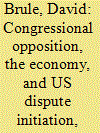

|
|
|
|
|
| Publication |
2006.
|
| Summary/Abstract |
Does congressional opposition constrain the president's conflict behavior in response to poor economic performance? Other research has shown that legislative constraints such as divided government reduce the executive's propensity to initiate conflict. But institutional constraints on democratic leaders may also make them likely to use force abroad when faced with deteriorating domestic conditions. The author argues that legislative constraints on presidential action during periods of economic decline compel the president to pursue alternatives that he can implement without congressional approval to display his leadership skills-including the use of military force abroad. The author examines the interactive effects of congressional opposition and economic performance on the propensity to initiate militarized interstate disputes from 1946 to 2000. The president is more likely to use force in response to economic decline when facing an opposition Congress than during years in which he enjoys partisan support in the legislature.
|
|
|
|
|
|
|
|
|
|
|
|
|
|
|
|
| 2 |
ID:
133653
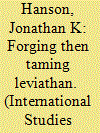

|
|
|
|
|
| Publication |
2014.
|
| Summary/Abstract |
Empirical research in the New Institutional Economics tradition has concentrated on the degree to which institutional constraints on rulers protect property rights and foster growth through private investment. This view of institutions is overly narrow, neglecting the role of state capacity in particular. Both state authority and constraints on rulers matter for economic performance, but the relative strength of these effects depends upon a country's distance from the frontier of the world economy. Tests using a panel data set that covers up to 84 countries from the period 1960 to 2005 reveal that, in countries that have low Gross Domestic Product (GDP) per capita, constraints on rulers in the form of checks and balances affect neither the rate of productivity growth nor the growth of capital stock per worker. Basic state authority, however, has a strong, positive effect on both of these outcomes. The story is different for advanced industrial economies, where the effects of checks are positive, especially with respect to productivity growth. Institutional checks on rulers are thus not an agent of investment-based growth but support continued growth based upon innovation at the leading edge.
|
|
|
|
|
|
|
|
|
|
|
|
|
|
|
|
| 3 |
ID:
178716
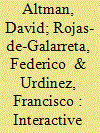

|
|
|
|
|
| Summary/Abstract |
Democracies do not take up arms against each other. Although this axiom has attained the status of a mantra in the field of international relations, this statement is much more complex than it appears, in part because it is highly contingent on the definitions and operationalizations of both democracy and conflict. This article revisits democratic peace theory, combining both institutional constraints and similarity-based arguments. Interactions between the democratic level of the dyad (the average democratic level of its members) and its democratic spread (difference between the democratic scores of its members) create a dyadic triangle that encompasses all possible combinations of cases, revisiting which dyads are more prone to conflict. The findings partially confirm and partially refute both the institutional constraints and the similarity-based arguments, leading to a nuanced alternative theory: the Interactive Model of Democratic Peace. Akin to democratic peace theory, our evidence shows that the higher a dyad’s level of democracy is, the lower the probability of fatal militarized interstate disputes between that pair of states. However, contrary to democratic peace theory, we find that dissimilar-regime dyads can still be peaceful as long as they have a high mean of democracy. Following the theory of regime similarity, we consider the democratic spread of each dyad, but we find that being similar is not a sufficient condition for peace between the members of a dyad. From the empirical evidence, the article derives three heuristic zones of conflict, filling much of the gray area that has been left unexplained by previous models.
|
|
|
|
|
|
|
|
|
|
|
|
|
|
|
|
| 4 |
ID:
093219
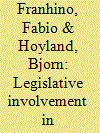

|
|
|
|
|
| Publication |
2009.
|
| Summary/Abstract |
In parliamentary systems, the need to preserve the political agreement that sustains the executive often motivates legislative involvement in policymaking. Institutional arrangements regulating executive-legislative relations and ministerial autonomy also structure parliamentary participation. However, empirical evidence of these effects remains limited to a few policies and countries. European Union legislation provides the opportunity to test expectations about legislative involvement for different types of measure across various institutional arrangements, across multiple policy areas, and across time. In this article, we investigate legislative involvement in the transposition of 724 directives in 15 member states from 1978 to 2004. Our results confirm that involvement increases as conflict between the responsible minister and her coalition partners intensifies. The discretionary scope embedded in the directive further inflates this effect. Additionally, parliamentary involvement decreases as the government's institutional advantage over the legislature increases, especially if intracoalitional conflict deepens.
|
|
|
|
|
|
|
|
|
|
|
|
|
|
|
|
| 5 |
ID:
166603
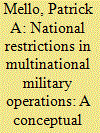

|
|
|
|
|
| Summary/Abstract |
Recent scholarship in security studies has started to explore the causes and consequences of various forms of national restrictions in multinational military operations (MMOs). This article makes a conceptual contribution to this literature by developing a theoretical framework of national restrictions in MMOs that distinguishes between structural, procedural, and operational restrictions. I argue that these types of restrictions are governed by different causal mechanisms. Structural restrictions are relatively stable over time and effect deployment decisions irrespective of other factors. Procedural restrictions, on the other hand, can constitute veto points against deployment only in combination with distinct political preferences. Finally, operational restrictions directly affect the rules of engagement of troop contributing countries. The article illustrates the three types of restrictions and their interaction with empirical examples from a range of countries and sketches their impact on MMO deployment decisions and mandates.
|
|
|
|
|
|
|
|
|
|
|
|
|
|
|
|
| 6 |
ID:
124289
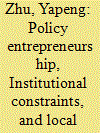

|
|
|
|
|
| Publication |
2013.
|
| Summary/Abstract |
Policy entrepreneurship has been a key concept to explain policy dynamics and policy changes. Despite considerable debate on the role of policy entrepreneurs in the policy making process, insufficient effort has been put forth on motivations of policy entrepreneurs and interactions between policy entrepreneurs and other key players in different settings. This article explores the role of policy entrepreneurship in local policy process in a transitional society, China, with special reference to housing reform experience in Guizhou Province. It argues that value, knowledge, and tactics such as framing are crucial for policy
|
|
|
|
|
|
|
|
|
|
|
|
|
|
|
|
| 7 |
ID:
120715
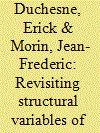

|
|
|
|
|
| Publication |
2013.
|
| Summary/Abstract |
Abstract This article offers a conceptual analysis of the negotiation of the Comprehensive Economic and Trade Agreement (CETA) between Canada and the European Union. It argues that traditional accounts of the structure of trade negotiations must be tailored for their novel nature, especially their wider scope on various regulatory issues and the relative economic weight of trading partners. To build our argument, we revisit traditional structural factors such as economic interdependence, non-agreement alternatives (NAA), institutional constraints, outcome valuations, and domestic support. We conclude that current and future bilateral trade negotiations will likely last longer, deadlocks will likely become more frequent, and that variations in scope will likely increase.
|
|
|
|
|
|
|
|
|
|
|
|
|
|
|
|
| 8 |
ID:
115110
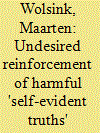

|
|
|
|
|
| Publication |
2012.
|
| Summary/Abstract |
This 'viewpoint' draws attention to a lingering, simplistic and faulty interpretation of the complex phenomenon of acceptance of renewables and their implementation in concrete projects by all relevant actors-namely the 'backyard theory'. During the last decade, research that investigated nimby has provided support to disprove the two prime hypotheses (proximity and decreasing property-value). The current mainstream trend in academic circles is clearly towards abandoning nimby explanations.
However, in practice among developers and policymakers nimby thinking still prevails. Unfortunately there is also some academic writing that persists in recycling the 'backyard theory'-despite ample research to the contrary-thus feeding this faulty interpretation of implementation problems. A recent review of the state of the art of wind power implementation is taken as an example; it presents nimby as a common-sense, self-evident truth, while to support this explanation it cites publications that actually refute this view and instead support the mainstream move towards abandoning nimby thinking. This shift is important, because further academic support for this concept would serve to hinder rapid deployment of wind power and also other renewables.
|
|
|
|
|
|
|
|
|
|
|
|
|
|
|
|
| 9 |
ID:
182682
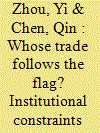

|
|
|
|
|
| Summary/Abstract |
This study revisits the association between bilateral relations and trade based on rare-event data from Integrated Data for Event Analysis (IDEA). Our results suggest that a country imports more from another if the two countries are friendlier. We further argue that states face two constraints when attempting to manipulate trade. First, they are constrained by domestic institutions such as elections and congress. Second, they are constrained by international institutions such as the World Trade Organization (WTO). Our results show that the imports of authoritarian countries follow the flag of politics, but democratic countries’ imports are less likely to be affected by bilateral relations. Moreover, WTO membership can gradually restrict democratic states from intervening on imports but has little impact on authoritarian governments.
|
|
|
|
|
|
|
|
|
|
|
|
|
|
|
|
|
|
|
|
|